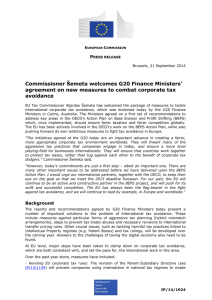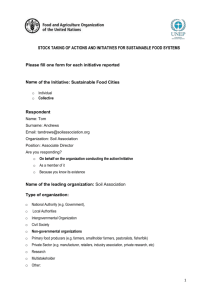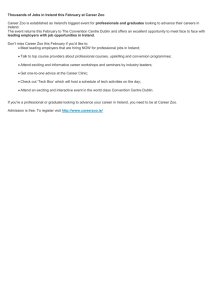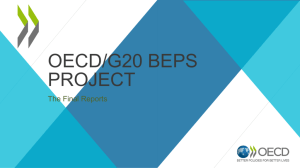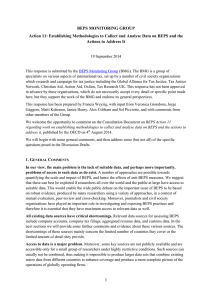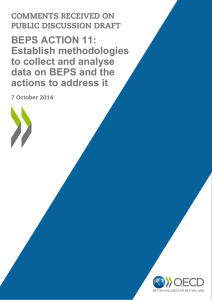Minister Michael Noonan at the IIEA Tax Conference
advertisement
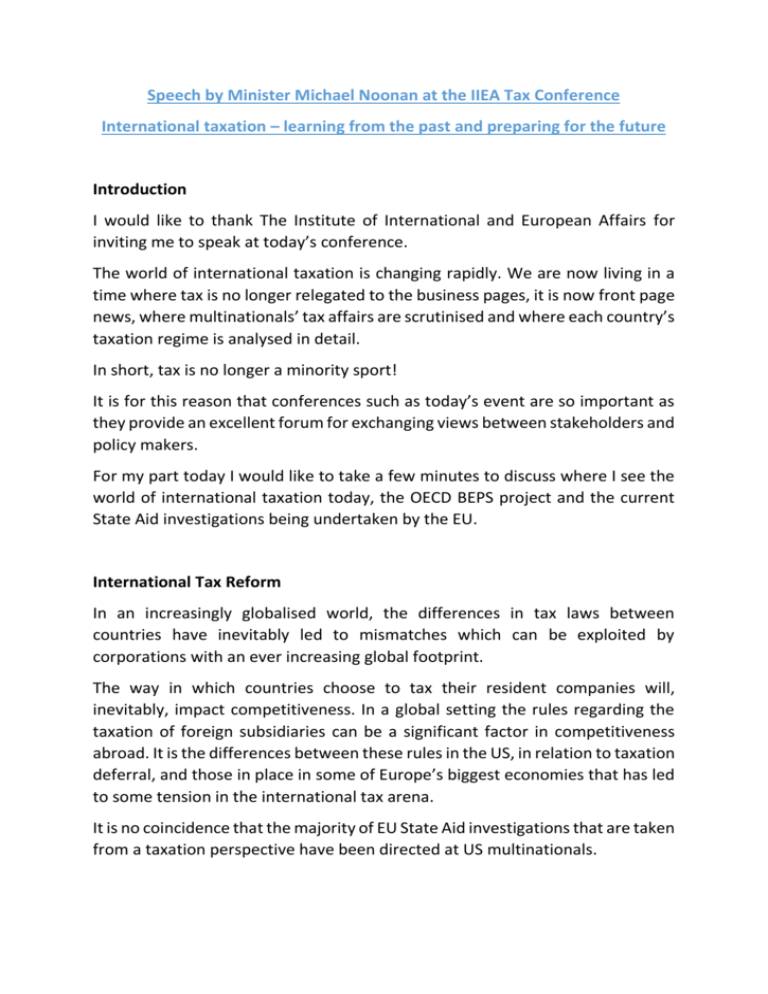
Speech by Minister Michael Noonan at the IIEA Tax Conference International taxation – learning from the past and preparing for the future Introduction I would like to thank The Institute of International and European Affairs for inviting me to speak at today’s conference. The world of international taxation is changing rapidly. We are now living in a time where tax is no longer relegated to the business pages, it is now front page news, where multinationals’ tax affairs are scrutinised and where each country’s taxation regime is analysed in detail. In short, tax is no longer a minority sport! It is for this reason that conferences such as today’s event are so important as they provide an excellent forum for exchanging views between stakeholders and policy makers. For my part today I would like to take a few minutes to discuss where I see the world of international taxation today, the OECD BEPS project and the current State Aid investigations being undertaken by the EU. International Tax Reform In an increasingly globalised world, the differences in tax laws between countries have inevitably led to mismatches which can be exploited by corporations with an ever increasing global footprint. The way in which countries choose to tax their resident companies will, inevitably, impact competitiveness. In a global setting the rules regarding the taxation of foreign subsidiaries can be a significant factor in competitiveness abroad. It is the differences between these rules in the US, in relation to taxation deferral, and those in place in some of Europe’s biggest economies that has led to some tension in the international tax arena. It is no coincidence that the majority of EU State Aid investigations that are taken from a taxation perspective have been directed at US multinationals. And while I would not like to get into the specifics of this debate I think it explains why we in Ireland, as a mid-Atlantic economy, are sometimes caught in the cross fire. That said, in my view, it is not right or fair that only US companies should be targeted in the international debate on the appropriateness of global tax laws. All countries and all companies throughout the world should have a stake in ensuring that international tax rules are fit for purpose. Lessons Learned In Ireland, we like many others, have made mistakes in the design of our domestic taxation system in the past, and it is these mistakes that we must learn from as we prepare for the future. We have, I hope, learnt lessons from the property based tax reliefs that were allowed to continue for too long with no clear rationale behind their maintenance. Lessons such as these must be applied domestically in designing the Irish tax code for the future. In this regard, on Budget day I published new Guidelines for the evaluation of tax expenditures and these have now been sent to all Secretaries General in all relevant Government Departments. But these lessons learnt must also be borne in mind when determining our international tax strategy. The so called “Double Irish” tax regime was never part of Ireland’s tax code. What’s more it was not a sustainable way to build a thriving foreign direct investment sector for the long term. As we have learned from the past, any regime that is built on unsure foundations will ultimately be shown to be not fit for purpose. It was for this reason that I made changes to our company residency rules in the recent Budget. These changes have further enhanced both the tax reputation of our country and the reputation of those companies that wish to do business here. You will have noted that the main industry bodies welcomed the changes as they give certainty to investors over the medium term and having held discussions with numerous stakeholders down through the years I am more than aware of how important certainty is in international business. However, what I have consistently stated from a tax policy perspective is that Ireland will play fair but we will also play to win. This belief led me to make a number of enhancements to our tax regime to best position that regime for a post BEPS era. These changes, announced on Budget day, were accompanied by a new Road Map for Ireland’s Tax Competitiveness. This Road Map updates last year’s International Tax Strategy and contains a comprehensive package of competitive tax measures which will provide the foundations for Ireland to maintain and expand our position as a thriving hub for Foreign Direct Investment well into the future. The enhancements included changes to the R&D tax credit, expansion of our intangible assets amortisation provisions, broadening of the special assignee relief programme and increased resources for the Revenue Commissioners’ competent authority function. The last of which we feel will become increasingly important in a post BEPS world. I have also signalled my intention to introduce a Knowledge Development Box in Budget 2016. However, as I stated it will be necessary to ensure that such a regime meets with the standards to be agreed both by the EU and the OECD BEPS process. Luxembourg Leaks I welcome the role that the International Consortium of Investigative Journalists have played in uncovering the information behind the recent Luxembourg tax leaks stories. Ireland’s 12.5% rate is one of the lowest in the OECD and we do not hide it, in fact, we broadcast this rate as the defining element of our corporate taxation system. The Irish tax regime is fully transparent as our rules are clearly laid down in statute. We have a proven track record of supporting transparency as we are early adopters of Automatic Exchange of Information, were the 4th country to sign up to FATCA and are vocal supporters of the Common Reporting Standard. Furthermore I note that a recent independent report carried out by PwC and the World Bank has designated Ireland as having the most efficient corporate tax system in Europe. Joint German, French, and Italian Tax Letter Some newspapers this morning outline the details of a letter that was sent by the Finance Ministers of Germany, France, and Italy to the European Commission urging that certain actions be taken to counter aggressive tax planning in the EU. French Finance Minister Michel Sapin was in Dublin last Friday and we discussed this letter, and I informed him that Ireland welcomes it as a positive contribution to the wider ongoing international debate regarding how best to tackle aggressive tax planning. Ireland supports all moves to increase tax transparency. As outlined in our Roadmap for Tax Competitiveness Ireland is maintaining its commitment to ensuring an open, and transparent tax regime. The main thrust of the letter is the call for a new EU Directive that will counter aggressive tax planning in the EU. Such a directive will take some time to design, to discuss and to develop, and of course tax remains a matter for unanimity at EU level. However Ireland will contribute constructively to these discussions in the EU, as it always does, while simultaneously holding a firm line that matters of direct taxation remain a Member State competence. OECD BEPS Ireland is fully supportive of the OECD BEPS project and is actively involved at all levels of the discussions. The work that has been undertaken is unprecedented and I would like to congratulate Mr Saint Amans on so far delivering on what are very ambitious time frames. Furthermore the quality of the output to date is a credit to all the countries involved and also the OECD secretariat for their tireless work. The goals of the project, as I see them, are twofold. The first goal is to eradicate double non-taxation and the second is to ensure that there is better alignment between substance and taxing rights. These goals are critically important and they are aligned with Ireland’s international tax strategy. While I remain overwhelmingly positive about the OECD BEPS project, there are inevitably a couple of concerns that I have with the BEPS process and I will discuss them in turn. My first concern is that BEPS must not be about advantaging big countries over small countries and equally must not be used to single out US multinational entities. If BEPS took this course it would merely be playing to the gallery and not be focussed on real tax reform. It is agreed that the BEPS process must strive to provide a level playing field for all but it must not become a tool used to increase the comparative competitiveness of larger nations at the expense of small countries. On this level playing field small countries must also be able to play fairly but play to win as we, in Ireland, have always tried to do. As I mentioned, I am opening a consultation on the Knowledge Development Box before the end of the year and the recent joint announcement by the UK and Germany brings the design of such a box into focus. The UK/German proposal calls for a modified nexus approach towards determining whether the activity in such a box would be deemed to be substantial and therefore not considered a harmful regime. In a nut shell it appears to me that the determining factor will be based upon whether any given entity, looking to access the benefits of the box, meets the required percentage of total R&D workforce in the group as a whole. This approach, on the one hand fits within Ireland’s core value of attracting substance based investment however on the other hand I do have concerns that such an approach, if designed too tightly, could have the potential to limit the scope for use by some smaller countries. Would this represent a fair reform? Further discussion is both planned and necessary in this area and I would encourage stakeholders to join the debate either through our public consultation or through the many avenues open at the OECD. My other concern in relation to the BEPS process is that it cannot just be a dialogue of the privileged. It would be a missed opportunity and morally careless if we let the excellent work being undertaken by the OECD to not be heard in the developing world. In Ireland we are coming towards the end of our own “spillover analysis” which I will be publishing in the coming months and which will highlight how our tax system impacts with the developing world. We believe that such research is critically important to ensure that the playing field that I have mentioned is both level but also open to all. I am aware that the OECD are actively trying to involve the developing world in the current discussions, however I think that, in order to show full commitment and foster a trusting relationship between the developed and developing world, the OECD should adopt at least in spirit a 16th action in the BEPS project that insists upon all countries undertaking spillover analyses of how their taxation regimes impact the developing world. EU State Aid I would like to take this opportunity to also welcome the recent comments of EU Commissioner Vestager in which she stated that the current state aid investigations would reach conclusion by the middle of next year. In relation to the one case in which Ireland is involved, while for legal reasons I am unable to discuss any specifics, my advice is that the case against us is weak and therefore I think that an early resolution would be in the best interests of everyone. As I have stated before, in the unlikely event that the European Commission does find against Ireland in this matter we will use every legal avenue open to defend our position. Conclusion To summarise the number of different aspects of my speech today I would remind everyone of the importance of evidence based policy making, the increasing requirement for international cooperation to steer a just and equitable course towards international tax reform, to learn from lessons of the past and finally the critical need to consider our impact on the developing world. Thank you. End

